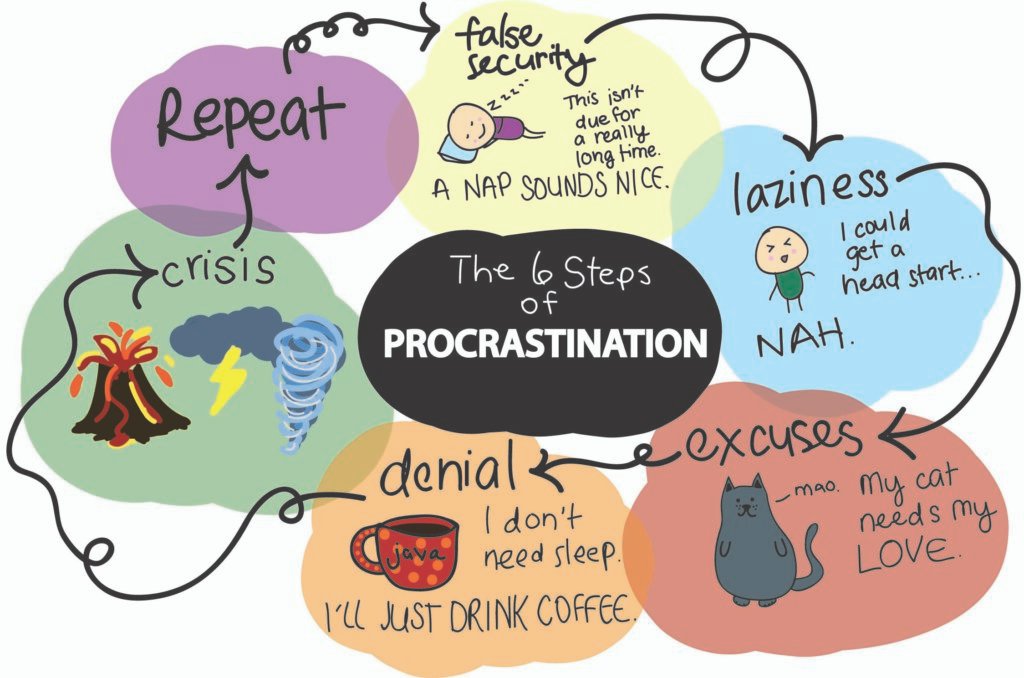Introduction to Procrastination
Procrastination is a concept that most people are familiar with. It is the act of delaying or putting off a task or activity that we know we need to do. However, many people don’t realize that procrastination is not only a bad habit but also a form of self-deception that robs you of success, productivity, and personal growth.
In this article, we look at the concept of procrastination, its pervasiveness in society, and how it can be viewed as a form of self-sabotage. Procrastination can be defined as delaying or putting off a task or activity that needs to get done. This is a common behavior that people often engage in without realizing it. Procrastination can manifest itself in several ways, e.g., by avoiding an activity entirely, being distracted, or delaying the start of an activity. Procrastination is a common behavior in society.
Procrastination affects people from all walks of life, including college students, professionals, and housewives. It is a behavior that can have negative consequences in both the short and long term. Procrastination can be viewed as a form of self-deception because it is contrary to our interests and goals.
When we procrastinate, we put off important tasks or activities that could bring us closer to success, productivity, or personal growth. We waste valuable time on irrelevant or unimportant activities instead of using that time to work towards our goals. This behavior can lead to missed opportunities, untapped potential, and self-dissatisfaction.
Why do we procrastinate?
Procrastination is a complex behavior influenced by various internal and external factors. Psychological and neurological causes of procrastination are fear of failure, low self-esteem, impulsiveness, and a lack of motivation. These factors can make it difficult for people to initiate and sustain effort towards a task or goal. Social and cultural factors such as a busy culture and the glorification of productivity can also contribute to procrastination. Several psychological and neurological factors contribute to this behaviour.
One of the most important psychological factors is a lack of motivation, which can be due to low self-esteem, depression, anxiety, or stress. When we lack motivation, we may find it difficult to initiate tasks and feel overwhelmed by the effort required to complete them.
Additionally, fear of failure can also lead to procrastination, as we may avoid starting a business altogether to protect ourselves from the negative emotions of failure. Procrastination is often accompanied by excuses for one’s behavior. Some common excuses include, “I work better under pressure,” I’m too busy right now,” or “I’m too tired to work on it right now.” These excuses can make it easier for people to justify procrastination and avoid taking responsibility for their behavior.

The Consequences of Procrastination
Procrastination can have negative consequences on different areas of our lives, including academic and professional success, increased stress and anxiety, damaged relationships, missed opportunities, and health consequences.
Chronic procrastination can lead to lower grades, missed deadlines, and reduced productivity at work. It can also lead to increased stress and anxiety, as well as strained relationships with coworkers, friends, and family members. Procrastination can also have health consequences, such as disrupted sleep patterns, increased risk of depression and anxiety, and decreased immune function.

Strategies for Overcoming Procrastination
Overcoming procrastination requires a proactive approach to changing our behavior. Some effective strategies for overcoming procrastination include setting achievable goals and deadlines, prioritizing tasks and breaking them down into smaller steps, using productivity techniques.
Here are some details on each of these strategies:
Set achievable goals and deadlines: Setting specific, achievable goals can help us break down larger tasks into smaller, more manageable steps. This can make the task less overwhelming and more manageable. Additionally, setting realistic deadlines can help us stay accountable and focused on getting the job done.
Prioritize tasks and break them down into smaller steps. Prioritizing tasks can help us see which tasks are most important and which need to be done first. Breaking larger tasks down into smaller steps can also make them more manageable and less overwhelming. It can help us avoid procrastination by making the task more manageable.
Using productivity techniques Like the Pomodoro Technique: The Pomodoro technique is a productivity technique that involves working for short, focused periods, followed by short breaks. This technique can help us stay focused and motivated while avoiding burnout or fatigue.
Seek Support from Friends, Family, or Professionals: Seeking support from others can help overcome procrastination. Friends, family, or colleagues can provide encouragement and motivation, while professionals such as therapists or coaches can provide more specialized support and advice.
Changing our attitude towards tasks and goals: Changing our attitude towards tasks and goals can also help overcome procrastination. By reframing tasks as opportunities for growth and learning rather than responsibilities or burdens, we can feel more motivated and engaged.

Conclusion
In summary, procrastination is a common behavior that can have negative consequences in various areas of our lives. By understanding the causes and consequences of procrastination, we can take steps to overcome it and achieve our goals. Strategies like setting achievable goals, breaking tasks into smaller steps, using productivity techniques, seeking support, and changing your mindset can help you overcome procrastination.
Overcoming procrastination is important to personal growth and success because it allows us to reach our potential and achieve our goals. By acknowledging and breaking our habits of procrastination, we can take control of our lives and achieve greater success and fulfillment.
The High Cost of Happiness: Why Money Can Buy Only Transitory Pleasures Trybe News




